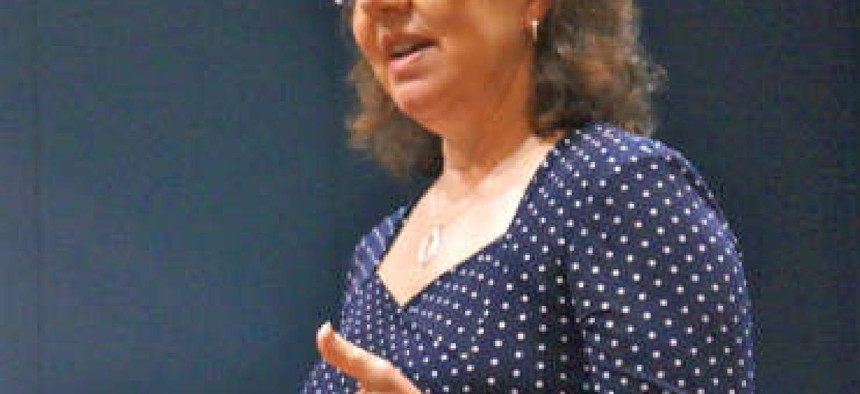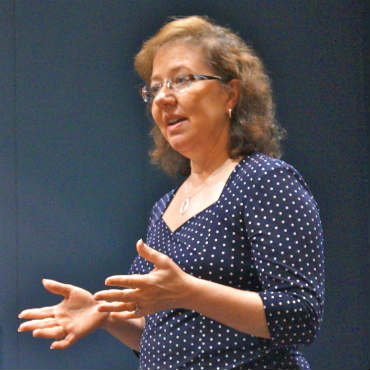Getting smarter about IT acquisition

OFPP and FAI aim to recruit, train, develop and retain talented acquisition professionals for the federal government, and revisions to the Federal Acquisition Certification in Contracting are just the beginning.

Joanie Newhart, associate administrator for the Office of Federal Procurement Policy, at the 2014 FOSE conference.
It’s been 15 months since Joanie Newhart, an associate administrator at the Office of Federal Procurement Policy, and Tony Grayson, acquisition program executive at the Federal Acquisition Institute, announced big plans for updating the certification for federal procurement professionals.
At the 2014 FOSE conference, Newhart talked about how FAI would revamp the Federal Acquisition Certification in Contracting (FAC-C), which hadn’t been updated since 2008, to include specialized training for IT procurement, among other improvements.
The week before, Lesley Field, who was OFPP’s acting administrator at the time, had issued a memo citing the importance of better aligning FAC-C with the Defense Department’s contracting certification curriculum to strengthen the development of civilian agencies’ acquisition professionals.
The new curriculum has been in place for more than a year, and efforts to improve acquisition continue to evolve.
Newhart recently told FCW that the new and improved FAC-C is part of a broader initiative to recruit, train, develop and retain talented members of the acquisition workforce at civilian agencies. The effort extends beyond FAC-C to include updated certifications for program managers and contracting officer’s representatives.
FAI is also establishing core-plus certifications in certain areas, with the first being IT specialization for program manager certification, Newhart added.
“The FAC-C refresh, which is broader than just IT-specific procurement training, strengthens the development and professionalization of civilian agency contracting professionals while better aligning the FAC-C to the DOD contracting certification,” she said. “For example, we now require Level I and Level II courses on cost and price analysis, and Level II courses on supply and service contracting. Overall, we require roughly 25 percent more hours of training than in the original FAC-C.”
The extended training and development reflect the increasing complexities that the federal acquisition workforce faces in using taxpayers’ money effectively in support of agency missions, she added.
The new program will dovetail with another OFPP effort — this one in partnership with the U.S. Digital Service — to create a Digital Service Contracting Professional Training and Development Program through a multi-phased challenge.
Traci Walker, lead contracting officer at USDS, said the challenge offers participants as much as $360,000 in prize money for ideas that will help USDS and OFPP better understand what the landscape will look like for IT acquisition professionals in the next several years.
In July, USDS announced three finalists that will move into Phase II of the program — GovLoop, Team ICF and ASI Government, and Management Concepts. Each finalist receives $20,000 to design their proposed program in more detail. The goal is to develop methods that USDS can use to teach federal contracting personnel to understand digital services, measure contract success based on industry standards and encourage commercial best practices in the federal procurement process.
At the end of Phase II, one winner will move into Phase III and “will pilot [its] approach with federal acquisition professionals” with the goal of creating a training and development program that can be implemented governmentwide in 2016, Walker told FCW. In addition, elements of the challenge might be incorporated into the core-plus certification program, she said.
Newhart also said the results of the challenge will figure prominently in how FAC-C addresses digital services. “We will be developing a core-plus specialization in digital for the FAC-C” after the challenge is completed, she said. “The program designs submitted during the challenge and the design of the completed pilot will help inform our specialized certification for digital.”
In addition, FAI plans to develop a core-plus specialization in other areas where specialized certifications might be helpful. “The drive to specialize is a part of our broader effort to train and develop our acquisition workforce more innovatively given what we’ve been hearing regarding how our workforce prefers to learn,” Newhart said.
Officials are open to other innovations for training and developing acquisition personnel. “We’re looking at cross-functional training involving the entire acquisition team, rotational assignments across functions (for example, a contracting officer on a detail to an IT program office), building career pathways for contracting professionals and developing more training offerings in agile methodology,” Newhart said.
Larry Allen, president of Allen Federal Business Partners, said the upgrades and new outreach efforts have been needed for some time. “Improving the federal acquisition workforce’s skill sets and engaging acquisition [workers] as agency partners” is a valuable shift from “basement-level buying [to] a 360-degree view of what an agency is doing,” he said.
The biggest problem for any program that seeks to keep up with IT, however, is the rapidly evolving nature of the technology itself. FAI and USDS have realized that “training isn’t static,” Allen said.
“Let’s not set it and forget it,” he added.
NEXT STORY: The outlook for OASIS


